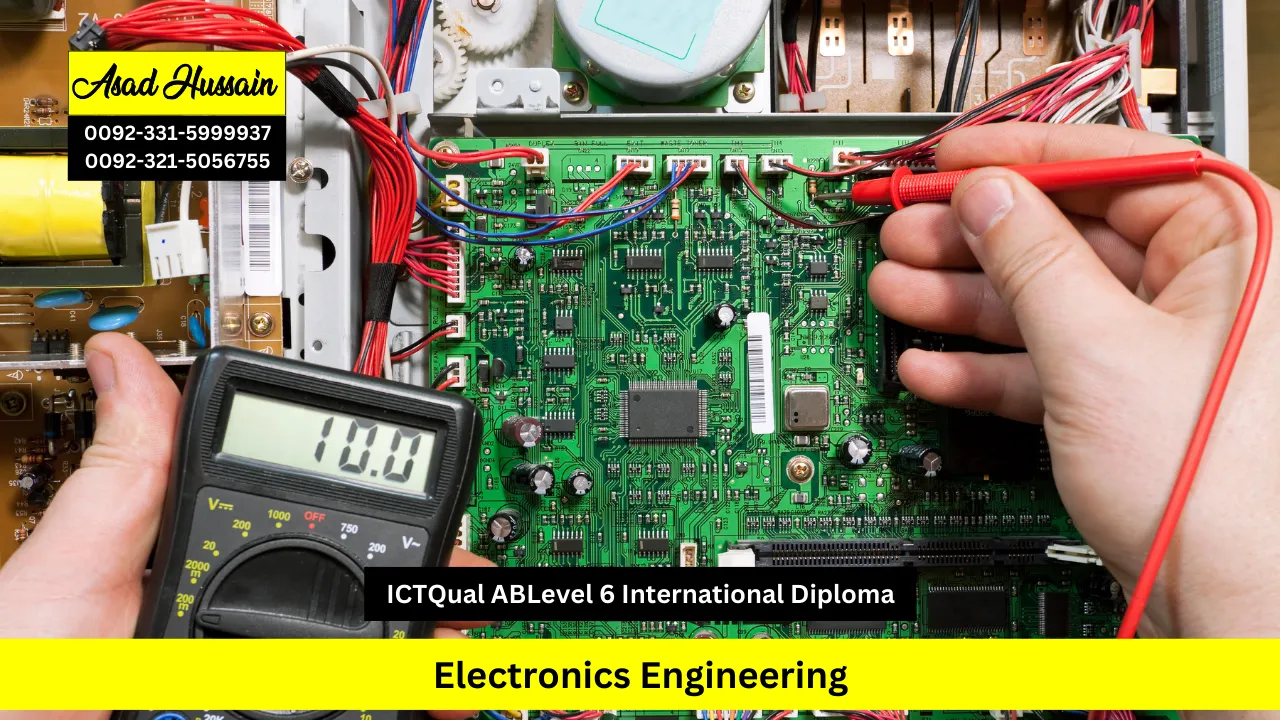The ICTQual ABLevel 6 International Diploma in Electronics Engineering is a globally recognized qualification designed to prepare learners for advanced roles in one of the most dynamic and innovative fields of modern technology. Electronics engineering is at the heart of today’s technological progress, powering everything from communication systems and automation to renewable energy solutions and smart devices. With the growing demand for skilled engineers worldwide, this diploma provides a competitive edge for individuals aspiring to excel in the global job market.
ICTQual AB Level 6 International Diploma in Electronics Engineering covers a wide range of advanced topics, including circuit design, digital and analog systems, microprocessors, embedded systems, power electronics, and control systems. Learners will develop the technical expertise to design, test, and optimize electronic systems while also gaining valuable problem-solving, analytical, and project management skills. The curriculum integrates theoretical knowledge with practical applications, ensuring graduates are fully prepared for real-world challenges in engineering and technology sectors.
By completing this diploma, learners will gain the confidence and competence to pursue careers in electronics engineering, telecommunications, industrial automation, energy systems, and research and development. Whether aiming to advance within their current profession or seeking opportunities abroad, this qualification opens pathways to leadership roles and specialized technical positions. The ICTQual AB Level 6 International Diploma in Electronics Engineering is not only a career-enhancing program but also a gateway to higher education and professional growth.
Program Highlights
Study Units
Year 1 – Foundation in Electronics Engineering
- Principles of Electrical and Electronics Engineering
- Introduction to Circuit Theory
- Digital and Analogue Electronics Fundamentals
- Electronic Components and Devices
- Fundamentals of Signal Processing
- Introduction to Microcontrollers and Embedded Systems
- Health, Safety, and Environmental Awareness
- Electrical Measurement and Instrumentation
- Laboratory Techniques in Electronics
- Technical Report Writing
- Introduction to Simulation and Design Software
- Basics of Power Electronics
Year 2 – Intermediate Electronics Engineering
- Advanced Circuit Design and Analysis
- Embedded System Programming
- Communication Systems Fundamentals
- Sensors, Transducers, and Instrumentation
- Power Electronics and Motor Control
- Microprocessor Architecture and Applications
- Process Control and Automation in Electronics
- Data Acquisition and Signal Conditioning
- Project Planning and Technical Communication
- Quality Control and Assurance in Electronics Systems
- Advanced Laboratory Techniques
- Electronics Standards, Safety, and Compliance
Year 3 – Advanced Electronics Engineering
- Advanced Embedded Systems and IoT Applications
- Robotics and Automation Systems
- Advanced Signal Processing Techniques
- Wireless and Telecommunication Systems
- Electronic System Design and Optimisation
- Power Systems and Renewable Integration
- Risk Assessment and Safety in Electronics Projects
- Advanced Laboratory Experiments and Testing
- Supply Chain and Logistics in Electronics Industry
- Capstone Project in Electronics Engineering
- Professional Development and Leadership in Engineering
- Strategic Decision-Making in Electronics Projects
The ICTQual AB Level 6 International Diploma in Electronics Engineering is designed for learners who wish to advance their academic knowledge and technical skills in electronics and electrical systems. To ensure participants are well-prepared for this advanced qualification, the following entry requirements must be met.
Age Requirements
- Applicants must be 19 years of age or older at the time of enrollment in ICTQual ABLevel 6 International Diploma in Electronics Engineering.
- Exceptionally talented learners below this age may be considered if they demonstrate prior learning or strong academic performance.
Educational Requirements
- A recognized Level 5 Diploma or equivalent qualification in engineering, electronics, electrical technology, or a related discipline is required.
- Candidates with strong backgrounds in mathematics, physics, or applied sciences may also be accepted.
Professional Experience
- Prior work experience in electronics engineering, electrical maintenance, or related industries is beneficial but not mandatory.
- Learners with industry experience may apply through Recognition of Prior Learning (RPL) to support their application.
English Language Proficiency
- Applicants must demonstrate proficiency in reading, writing, and speaking English, as the course is taught entirely in English.
- Those without formal English qualifications may undergo an assessment or interview to verify their language skills.
These entry requirements are designed to ensure that learners entering the ICTQual AB Level 6 International Diploma in Electronics Engineering have the academic preparation, language ability, and where applicable, professional background needed to excel.
The ICTQual AB Level 6 International Diploma in Electronics Engineering is designed to provide learners with advanced knowledge, practical skills, and professional competencies required to excel in the rapidly evolving electronics industry. This three-year, 360-credit programme ensures learners acquire foundational, intermediate, and advanced capabilities in electronics design, embedded systems, signal processing, automation, and project management.
Year 1 – Foundation in Electronics Engineering
Principles of Electrical and Electronics Engineering
- Explain fundamental concepts of electrical circuits and electronics principles.
- Analyse basic electrical systems for performance and efficiency.
- Apply theoretical knowledge to solve introductory electronics problems.
Introduction to Circuit Theory
- Understand the behavior of electrical circuits using laws and theorems.
- Solve circuit problems with accuracy and critical reasoning.
- Apply circuit analysis techniques in practical scenarios.
Digital and Analogue Electronics Fundamentals
- Differentiate between digital and analogue systems and their applications.
- Analyse basic electronic circuits and signal processing tasks.
- Apply knowledge to design and test simple circuits.
Electronic Components and Devices
- Identify and describe functions of key electronic components.
- Select appropriate components for specific circuit designs.
- Apply component knowledge in laboratory and project work.
Fundamentals of Signal Processing
- Understand basic signal types and processing techniques.
- Analyse signals for noise reduction and optimization.
- Apply signal processing fundamentals in practical electronics projects.
Introduction to Microcontrollers and Embedded Systems
- Understand the architecture and operation of microcontrollers.
- Program simple embedded systems for basic applications.
- Apply microcontroller knowledge in lab-based exercises.
Health, Safety, and Environmental Awareness
- Recognize potential hazards in electronics labs and workplaces.
- Apply safety protocols and environmental standards in practical settings.
Electrical Measurement and Instrumentation
- Operate instruments for voltage, current, and signal measurements.
- Interpret measurement data to evaluate system performance.
- Apply instrumentation skills to enhance circuit testing and diagnostics.
Laboratory Techniques in Electronics
- Conduct experiments safely and systematically.
- Record and analyse experimental data accurately.
- Apply laboratory techniques to reinforce theoretical learning.
Technical Report Writing
- Produce clear and structured technical documentation.
- Communicate complex electronics concepts effectively.
- Apply professional standards in report preparation.
Introduction to Simulation and Design Software
- Operate basic electronic design and simulation tools.
- Analyse simulation outputs for circuit performance.
- Apply software skills to practical electronics projects.
Basics of Power Electronics
- Understand principles of power conversion and control.
- Analyse simple power electronic circuits.
- Apply knowledge in practical lab or project settings.
Year 2 – Intermediate Electronics Engineering
Advanced Circuit Design and Analysis
- Design complex analogue and digital circuits using advanced methods.
- Analyse circuit behavior under varied operating conditions.
- Apply circuit design principles in practical projects.
Embedded System Programming
- Develop software for microcontrollers and embedded systems.
- Implement real-world embedded applications.
- Test and troubleshoot embedded solutions effectively.
Communication Systems Fundamentals
- Understand principles of wired and wireless communication.
- Analyse communication signals and system performance.
- Apply theoretical concepts in practical communication projects.
Sensors, Transducers, and Instrumentation
- Identify and apply different sensors and transducers.
- Integrate instrumentation devices into electronics systems.
- Analyse and interpret sensor data for decision-making.
Power Electronics and Motor Control
- Understand and apply power conversion techniques.
- Analyse motor control systems for industrial applications.
- Implement power electronics concepts in practical projects.
Microprocessor Architecture and Applications
- Describe microprocessor structure and functionality.
- Develop applications using microprocessor-based systems.
- Apply architectural knowledge to optimize embedded designs.
Process Control and Automation in Electronics
- Implement control strategies for automated systems.
- Analyse system performance and optimize operations.
- Apply automation techniques in lab or real-world projects.
Data Acquisition and Signal Conditioning
- Design and implement data acquisition systems.
- Process and condition signals for accurate measurement.
- Apply skills to support electronics testing and research.
Project Planning and Technical Communication
- Plan electronics projects with timelines, resources, and objectives.
- Communicate project outcomes clearly to technical and non-technical audiences.
Quality Control and Assurance in Electronics Systems
- Monitor and evaluate electronics systems for compliance and quality.
- Apply corrective measures and continuous improvement methods.
Advanced Laboratory Techniques
- Conduct complex experiments with precision and safety.
- Analyse results and apply findings to system improvements.
Electronics Standards, Safety, and Compliance
- Understand industry standards, codes, and regulations.
- Apply compliance measures to design and operational tasks.
Year 3 – Advanced Electronics Engineering
Advanced Embedded Systems and IoT Applications
- Develop advanced embedded solutions for IoT devices.
- Integrate sensors and networks for intelligent systems.
- Apply IoT solutions in real-world projects.
Robotics and Automation Systems
- Design and implement robotics control systems.
- Analyse automated processes for efficiency and accuracy.
- Apply robotics knowledge to industrial applications.
Advanced Signal Processing Techniques
- Process complex signals for communication and control.
- Implement filtering, modulation, and analysis techniques.
- Apply signal processing skills in practical projects.
Wireless and Telecommunication Systems
- Understand wireless communication protocols and technologies.
- Analyse system performance and troubleshoot issues.
- Apply knowledge to design practical communication solutions.
Electronic System Design and Optimisation
- Design integrated electronics systems for specific applications.
- Optimise system performance, reliability, and efficiency.
- Apply design and testing skills in projects.
Power Systems and Renewable Integration
- Understand power systems and integration with renewable sources.
- Analyse system efficiency and stability.
- Apply principles to sustainable electronics and energy projects.
Risk Assessment and Safety in Electronics Projects
- Identify hazards and assess risks in electronics operations.
- Implement safety measures and mitigation strategies.
Advanced Laboratory Experiments and Testing
- Conduct sophisticated experiments with accuracy.
- Evaluate system performance and optimise designs.
Supply Chain and Logistics in Electronics Industry
- Understand supply chain operations for electronic components.
- Apply logistics planning to project and industrial contexts.
Capstone Project in Electronics Engineering
- Integrate all learning outcomes into a comprehensive project.
- Demonstrate problem-solving, design, and analytical skills.
- Present findings and project reports professionally.
Professional Development and Leadership in Engineering
- Develop leadership and project management skills.
- Apply professional ethics and standards in engineering practice.
Strategic Decision-Making in Electronics Projects
- Analyse complex engineering scenarios for decision-making.
- Implement strategies to optimise performance and outcomes.
Upon completion of the ICTQual AB Level 6 International Diploma in Electronics Engineering, learners will have gained advanced technical knowledge, practical skills, and professional competencies essential for careers in electronics design, embedded systems, automation, telecommunications, and leadership roles in the global electronics industry.
The ICTQual AB Level 6 International Diploma in Electronics Engineering is designed for a wide range of learners who aim to advance their expertise and make meaningful contributions to the field of electronics. This qualification caters to professionals, educators, and newcomers who wish to develop advanced technical skills and industry knowledge.
Educational Instructors and Trainers
- Enhance teaching methodologies with advanced electronics engineering concepts.
- Apply updated technical knowledge to train and mentor future engineers.
Environmental Advocates and Activists
- Gain insights into sustainable electronics practices and energy-efficient technologies.
- Advocate for environmentally responsible approaches in electronics manufacturing and usage.
Students and Recent Graduates
- Build a strong foundation in electronics engineering and applied technologies.
- Gain practical skills to transition seamlessly into professional roles or advanced studies.
Career Changers
- Acquire the technical expertise required to enter the electronics industry.
- Develop transferable skills applicable to areas such as IT, automation, and energy systems.
Policy Makers and Regulators
- Understand the technical and safety standards within the electronics sector.
- Apply regulatory frameworks to ensure compliance and promote sustainable industry growth.
This diploma is ideally suited for individuals seeking to advance their careers, transition into electronics engineering, or contribute to teaching, policymaking, and sustainability efforts within the field. By enrolling in the ICTQual AB Level 6 International Diploma in Electronics Engineering, learners position themselves as skilled professionals equipped to address the evolving challenges and innovations in the global electronics industry.







